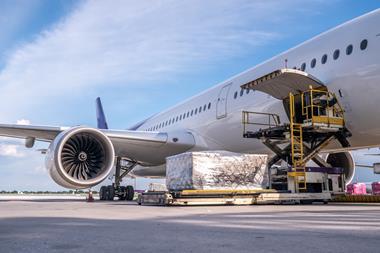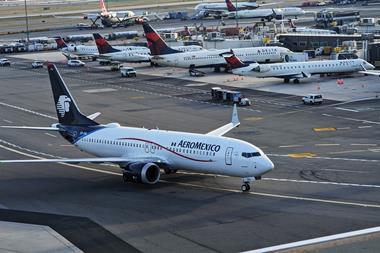In its fourth-quarter 2022 financial results for the three months ended December 31, Expeditors International posted year-on-year declines in operating income, revenues and volumes as demand normalised after the pandemic – and then fell off in response to economic uncertainty.
Operating income for the logistics firm decreased by 47% to $330m compared to the same quarter of 2021, while revenues were down 36% at $3.4bn. Airfreight volumes fell 20% (and ocean container volumes dropped 15%).
For the full year, operating income fell by 4% to $1.8bn while revenues rose by 3% to $17.1bn.
President and chief executive Jeffrey Musser said: “As pandemic-related bottlenecks eased and air and ocean supply/demand imbalances began to dissipate in the first half of the year, average buy and sell rates progressively declined to varying degrees, as they typically do – until they suddenly began to plummet simultaneously and faster than we would have expected in the fourth quarter. The rapid turnaround in Q4 was stunning and unparalleled.”
He added that demand during the three-month period was softer than anticipated, particularly in the retail and high-tech verticals.
Musser explained: “Many shippers had stockpiled inventory and pulled orders forward early in 2022, in a concerted effort to avoid the worst of the supply chain bottlenecks that materialised during the pandemic, when abrupt shutdowns and stay-at-home orders transformed how we live and do business.
“Those conditions, which were already starting to ease throughout the first three quarters of 2022, quickly reversed course as we entered the fourth quarter and shippers swiftly adapted to increased consumer caution and slowing demand for their products, while also battling inflation and tighter financing.”
Expeditors felt the hit most in North Asia, where the lingering effects of lockdowns contributed to the largest declines in the logistics company’s air tonnage and ocean volumes in at least a decade.
Senior vice president and chief financial officer Bradley Powell echoed Musser: “This quarter was heavily impacted by a rapid reversal from the most robust operating environment we have ever seen."
Looking ahead, Musser said: “We recognise that the pandemic tailwind is gone and we are now in a marketplace in which the supply chain appears to have largely normalised.
"Nevertheless, a level of uncertainty remains and shippers are prioritising cost controls as they scramble to adapt to an increasingly fragile global economy.
“While we remain very optimistic about the future, our short-term outlook is somewhat uncertain due to a difficult economic environment and the resetting of supply and demand, which has a direct impact on available capacity and pricing.
“We plan to move forward with a sharp eye on aligning expenses with revenues, particularly over the next one or two quarters. Our focus will be on maintaining our existing accounts and gaining new business, while reducing overall expenses.
"Just as we quickly configured our operations to accommodate unprecedented chaos and complexity during the pandemic, we now need to address our operations for a post-pandemic environment of soft demand and pressured pricing."
https://www.aircargonews.net/policy/air-cargo-security/expeditors-continues-recovery-following-cyber-attack/















